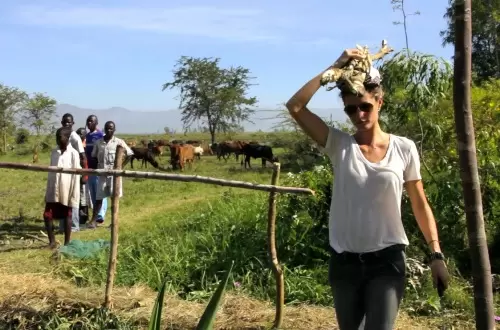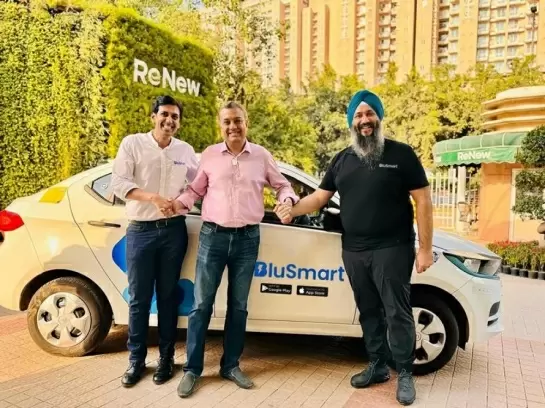“Too often, women suffer the consequences of environmental damages”

18-July-2015
Vol 6 | Issue 29
Did you know how big an impact a simple wood-burning stove can have on a woman’s life? Stoves produce toxic smoke that harms the environment as well as human health.
In fact, more people die from this smoke than malaria - globally, about 4.3 million every year. And that’s not all. For women, in particular, sourcing enough wood to power the stove is also a huge burden.
Not only do they spend many hours collecting firewood but carrying huge loads on their back for miles on end is extremely punishing. In this special opinion piece, supermodel and UNEP Goodwill Ambassador for the Environment Gisele Bündchen pens her experiences from her travels in Kenya, making a strong case for energy solutions that are women-friendly and environmentally safe.
 |
|
To learn about the way rural women lived in Kenya, Gisele Bündchen visited a village on the outskirts of Kisumu city and carried wood for five miles to identify with what the women went through (Photo Courtesy: ProjectGAIA)
|
I believe that if you want to help the world be a better place, you have to learn about what is happening in different countries. When we break out of our bubbles, we can see what we can do to bring about change. For instance, when I went to Kenya, I learned a lot about the problems of environment and energy, and also how amazing women are when they work together.
I could see for myself what the Beijing Platform for Action means. This visionary agenda for women’s empowerment was adopted almost 20 years ago, yet it already talks about gender inequalities in managing natural resources and safeguarding the environment, and how we need to break these barriers.
Too often, women suffer the consequences of environmental damages with little say in how to do things differently. At the same time, women, in their own way, are on the frontlines of protecting our environment. We understand that our futures depend on it.
Did you know how big an impact a simple wood-burning stove can have on a woman’s life? In many developing countries people use these because they do not have access to modern energy sources like electricity.
The stoves produce a lot of toxic smoke that harms the environment and human health. More people die from this smoke than malaria - globally, about 4.3 million every year. That is horrible. In rural Kenya, however, people don’t have other options – only four per cent have access to electricity.
Getting enough wood to fire up the stove is also a huge burden for women, who spend many hours collecting and carrying it. I wanted to see this for myself, so I went with women in a village outside Kenya’s city of Kisumu.
At least two times a week they gather wood, leaving at dawn and coming home at dusk. As so many of the nearby trees have already been cut down, they have to walk for many hours.
The day I went we covered more than five miles, which they said was a short trip. The heat was intense, and we had to carry heavy tools. The women told me they were worried about how so much of the forest had been cut down. They wondered where they would get wood in the future.
When we arrived at a place to cut wood, we found it full of thorns that pricked our fingers. Each woman cut about 40 kilograms - enough to fill two very large suitcases. They carried it back on their heads. I could only carry about one-fifth of what they normally do.
It made me understand how modern energy is vital to people’s lives. These women are strong and work hard to care for and feed their families, but they need new kinds of fuel.
Fortunately, more and more women in Kenya and in other countries are involved in looking for workable solutions to this problem, like slow-cooking stoves made from local clay and smoke hoods that reduce pollution in homes by up to 70 per cent. The stoves use 50 per cent less wood, a win-win for people and the environment.
One of my favorite people on my trip to Kenya was Naomi, a community leader. She has developed a fireless cooker, which conserves wood and reduces smoke inside. It keeps food warm for eight hours after cooking, so fires can be put out to save wood.
Even though she faces many challenges, Naomi maintains a refreshingly positive outlook on life. She shared with me the great joy she gets from making others laugh! I saw she was well-liked and respected by other women in her village.
There are many women like her around the world: smart, strong and positive. We all benefit when they share their energy and their ideas, unrestricted by gender inequality. Our common environment is too big a concern to leave anyone out of better caring for it, and women are definitely central to finding solutions.
I believe we should all have a dream no matter what our circumstances are. The women I met in Kenya reminded me of how important it is to never give up.
They showed me that empowering women means empowering humanity. We should always believe in ourselves and our power to make a difference.
(This article is part of U.N. Women’s Empowering Women — Empowering Humanity: Picture It! campaign in the lead-up to Beijing+20.) - Women's Feature Service














